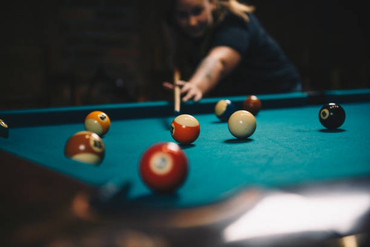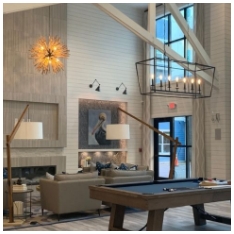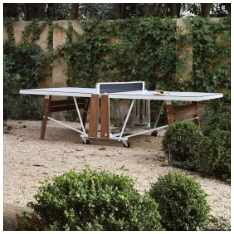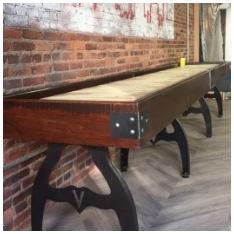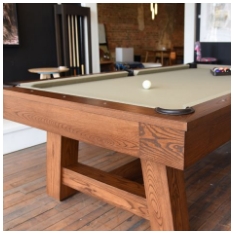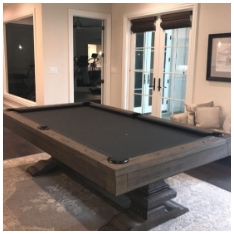Billiards, snooker, and pool are often grouped together because they share similar equipment: a cue, balls, and a table. However, each game comes with its own rules, strategies, and equipment specifications. The short answer is yes, but with limitations. While it’s possible to set up and enjoy a casual game of snooker on a pool table, there are key differences in table size, ball dimensions, and pocket shapes that make the experience different from playing on a traditional snooker table.
This article will explain how the two games differ, what adjustments are needed, and whether playing snooker on a pool table is a practical option.
Understanding the Differences Between Snooker and Pool Tables
Before answering whether snooker can be played on a pool table, it’s important to understand how these tables differ.
Table Size
- Snooker Tables: Standard tournament snooker tables measure 12 feet by 6 feet, making them much larger than pool tables. This extra space is crucial for the long shots and strategic play in snooker.
- Pool Tables: Typically range between 7 and 9 feet long. Their compact design makes them more suitable for fast-paced pool games.
Pocket Design
- Snooker tables have narrower, rounded pockets with tighter entrances. They require high accuracy and precision.
- Pool tables have wider, angled pockets, making potting easier compared to snooker.
Ball Size
- Snooker balls are smaller, measuring about 52.5 mm in diameter.
- Pool balls are larger, usually around 57 mm in diameter.
These differences significantly affect gameplay, but they don’t completely prevent snooker from being adapted to a pool table.

Can You Play Snooker on a Pool Table?
Yes, you can. However, it won’t be the same as playing on a regulation snooker table. A pool table can be used as a substitute for recreational snooker, but it comes with adjustments:
- Scaled-down Snooker Sets: Manufacturers produce smaller snooker ball sets that are designed for pool tables. Using these balls makes the game more manageable on a smaller surface.
- Rule Adjustments: Because of the limited space and pocket design, some rules may need to be modified for a smoother game.
- Expectations: The gameplay experience won’t be identical to traditional snooker, but it can still be enjoyable, especially for practice or casual play.
How to Set Up Snooker on a Pool Table
If you want to try snooker on a pool table, here’s a practical setup process:
Step 1 – Choose the Right Ball Set
Purchase a snooker set designed for pool tables. These typically come in reduced sizes so they fit proportionately on smaller tables.
Step 2 – Arrange the Balls
Set up the reds in a triangle, place the colored balls on their respective spots, and follow standard snooker placement as closely as possible.
Step 3 – Adjust the Rules
Because of space limitations, you may want to shorten the game. For example:
- Reduce the number of red balls from 15 to 10.
- Limit frame scoring to suit the shorter table.
Step 4 – Play with Expectations
Understand that pocketing and angles will feel different due to the pocket design of pool tables. This will affect shot-making and strategy.
Pros of Playing Snooker on a Pool Table
While not a perfect replacement, using a pool table for snooker has its benefits:
- Accessibility: Most people have easier access to a pool table than a full-sized snooker table.
- Space Saving: Pool tables are smaller and fit better in home game rooms.
- Casual Play: It’s an excellent way to practice snooker-like shots without needing a full snooker setup.
- Affordability: Snooker tables are expensive, while pool tables are more budget-friendly.
Challenges of Playing Snooker on a Pool Table
There are also drawbacks to be aware of:
- Smaller Playing Surface: Strategic long shots that define snooker are harder to replicate.
- Pocket Size Difference: Easier pockets reduce the difficulty level, changing the nature of the game.
- Ball Size Variation: Using full-sized snooker balls on a pool table isn’t practical; scaled sets are required.
- Gameplay Accuracy: True snooker precision is difficult to achieve on a pool table setup.
Alternatives to Playing Snooker on a Pool Table
If you’re serious about playing snooker but don’t have access to a full table, there are alternatives:
Smaller Snooker Tables
Manufacturers produce 6-foot and 8-foot snooker tables for homes. These give a closer experience to traditional snooker than adapting a pool table.
Hybrid Tables
Some multi-purpose tables can convert between pool, snooker, and even table tennis. These are practical for those who want versatility in limited space.
Snooker Clubs and Community Halls
Joining a local snooker club allows you to play on regulation tables without investing in one at home.
Tips for Enjoying Snooker on a Pool Table
If you decide to try snooker on a pool table, these tips will help:
- Invest in Smaller Balls: Always use a ball set proportionate to the table size.
- Modify Rules Fairly: Ensure all players agree on adapted rules before starting.
- Practice Shot Selection: Focus on precision and strategy, even if the table makes shots easier.
- Use It for Training: While not identical, playing snooker on a pool table can still improve your cue skills.
Final Thoughts
So, can you play snooker on a pool table? Yes, but with adaptations. While the gameplay experience won’t match that of a regulation snooker table, a pool table can provide a fun and practical alternative, especially for casual play and practice.
If your goal is to enjoy the fundamentals of snooker—strategic shot-making, cue control, and practice—a pool table setup can work well. However, if you’re looking for an authentic snooker experience with all the challenge and precision the game offers, playing on a dedicated snooker table is the best choice.
